Apply for a virtual Nobepay credit card suitable for overseas online shopping, supporting ChatGPT/OpenAI payments.
Publish: 2023-01-01 | Modify: 2025-01-07
Virtual credit card is a new type of payment tool that can help consumers make online payments more securely and conveniently. The advantages of virtual credit cards lie in providing consumers with more security and convenience, as well as having a wider range of uses.
Recently, I learned about a virtual credit card service provider called "Nobepay," recharged and activated several virtual credit cards, and found it to be quite good. I recommend it to friends who do not have a physical credit card but have a need for overseas shopping.
Features of Nobepay
- Customizable name and address information, or one-click generation of a virtual address
- Unlimited card issuance, use as needed, unused cards can be deleted, and the balance will automatically return to the account for the next card issuance
- Transparent fees, only charging card issuance fees and recharge handling fees, without any hidden fees
- Multi-functional use, daily shopping consumption, support for binding to US PayPal, support for binding to Alibaba Cloud International, support for Google Play, etc.
- Recharge in Chinese Yuan, only available for recharging with the bound WeChat, which is almost instantly credited to the account
- Recharge methods include PayanYing, Wanlihui, Kongzhongyunhui, bank wire transfer, and ACH USD recharge
- Paid download of card statements available for address verification purposes
- API interface available for integration
Terms and Restrictions
- Chargeback rate, refund rate, and refund amount rate must be below 10%
- Malicious chargebacks/refunds are prohibited
- Prohibited activities include taking advantage of promotions, freebies, etc., such as server subscriptions, 0-dollar authorizations for bulk card issuance without consumption
- Prohibited from using financial products, various domestic software or platforms, adult websites, phishing websites, such as onlyfans, WeChat, Alipay, Taobao, PayPal, Wise, Venmo, etc.
- Any category that may trigger bank risk control is prohibited, without prior notice
- Violation of any of the above rules, or triggering unknown bank risk controls, will be considered as improper use, and violators will have their accounts suspended and withdrawals prohibited.
Registering on Nobepay
I'll put the precautions at the beginning to avoid pitfalls.
- Nobepay requires real-name authentication before use, not recommended for those who mind real-name registration
- Nobepay has a minimum recharge requirement of 500 yuan
- The platform is very strict against activities like taking advantage of promotions, chargebacks, etc. Once discovered, accounts will be suspended without notice and refunds
Being strict may filter out most users, but it also ensures stability. So, if you can accept the strict conditions above, you can continue reading, otherwise, you can give up directly.
Registration link: https://nobepay.com/app/login?type=azmzep&code=0B1104E, Invitation code:
0B1104E
When you open the official website, the default interface is in English. Click on the top right to switch to Chinese, then click on "Register Now." Some points to note:
- WeChat must be filled in with your real-name WeChat, cannot be filled randomly. Real-name authentication is completed through WeChat later, and WeChat recharge will also verify if the filled-in WeChat matches (seems to be using Alipay for recharge now)
- Nobepay uses an invitation code registration mechanism, so the invitation code is also required. Please use
0B1104Eas the invitation code
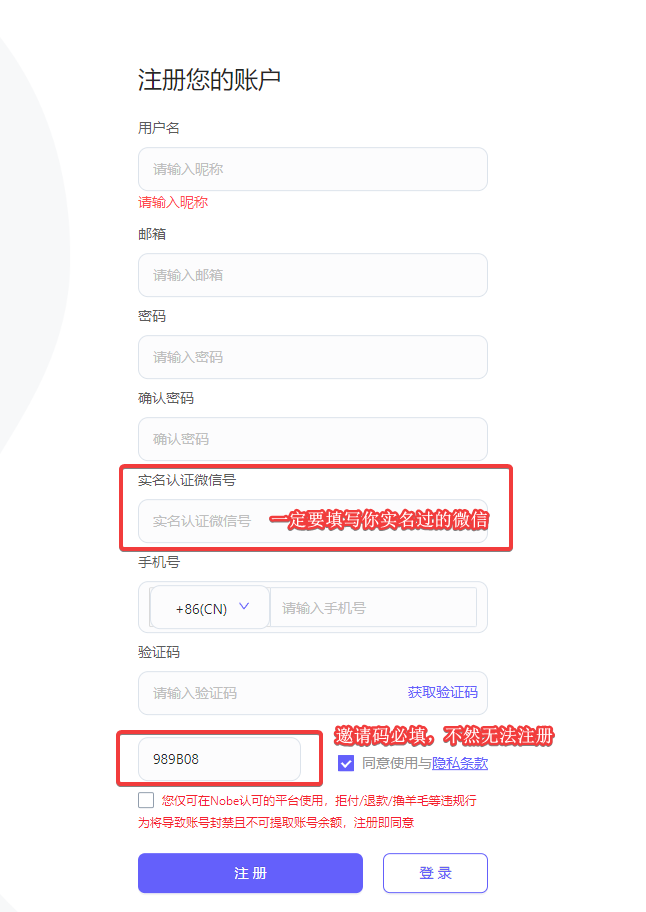
After registration, follow the instructions to complete the real-name authentication. Since I have already completed the real-name authentication, I cannot provide a screenshot here.
About Recharging
Nobepay offers several recharge methods, including online recharge, customer service recharge, USDT recharge, and USD recharge. Generally, we only need to use "online recharge," which only supports WeChat Pay (now seems to have switched to Alipay), and it must match the WeChat account used for real-name authentication. The minimum requirement for online recharge is 500 yuan, and it is credited almost instantly. (A handling fee of 5 yuan will be charged during recharge)
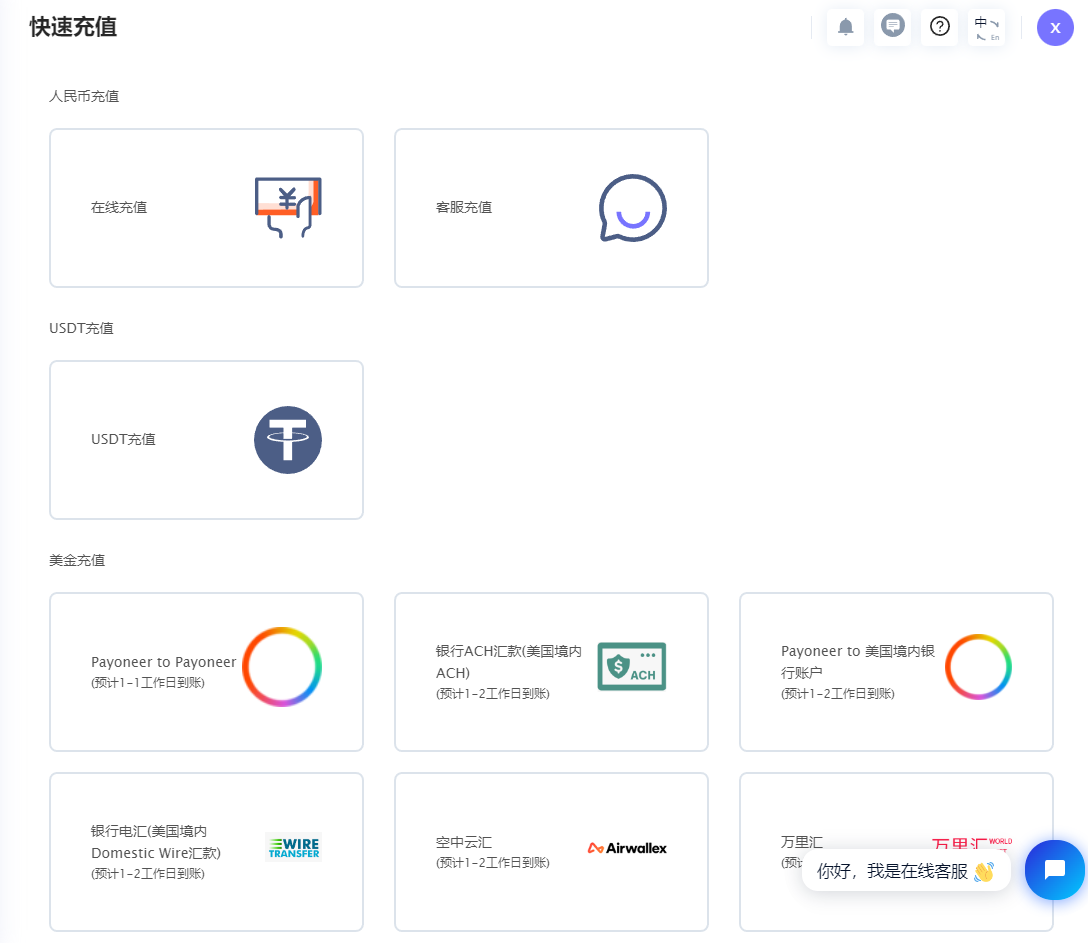
Card Issuance
After recharging, we can start using the card on Nobepay. Nobepay supports various types of virtual credit cards. If you are unsure which card is suitable for you, you can consult the online customer service.

There is a fee for card issuance, and the issuance fee varies for different types of cards, generally ranging from 1-5$. The minimum recharge requirement is 10$, while some cards require a minimum of 30$, with a service fee of 3%. The fee composition includes: card issuance fee (1-5$) + recharge (minimum 10$) + service fee (3% of recharge amount)
When issuing a card, you can choose to generate a random address. However, it is recommended to change the FirstName to your name (pinyin) and LastName to your surname (pinyin) to facilitate binding the credit card to other platforms to verify if your name matches.
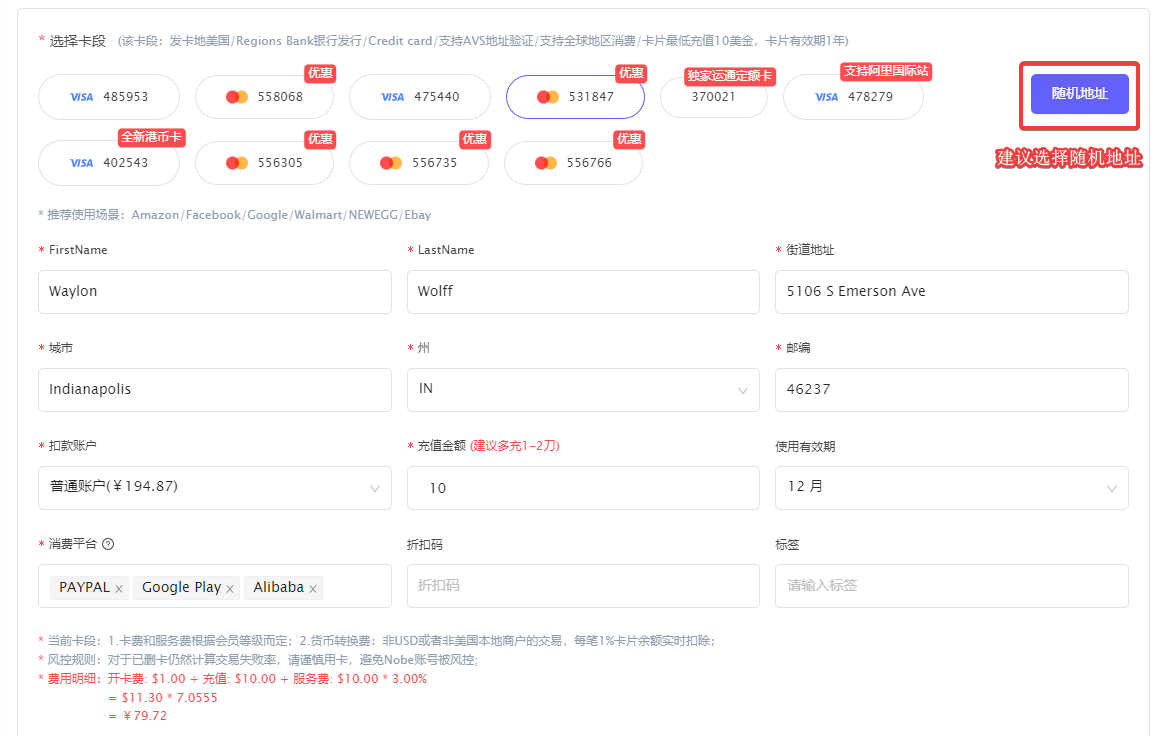
When issuing a card, you can select any consumption platform randomly; there is actually no restriction on consumption platforms. If you use it to subscribe to ChatGPT or pay OpenAI bills, note that Nobepay's official public announcements will list supported card segments, as shown in the image below.
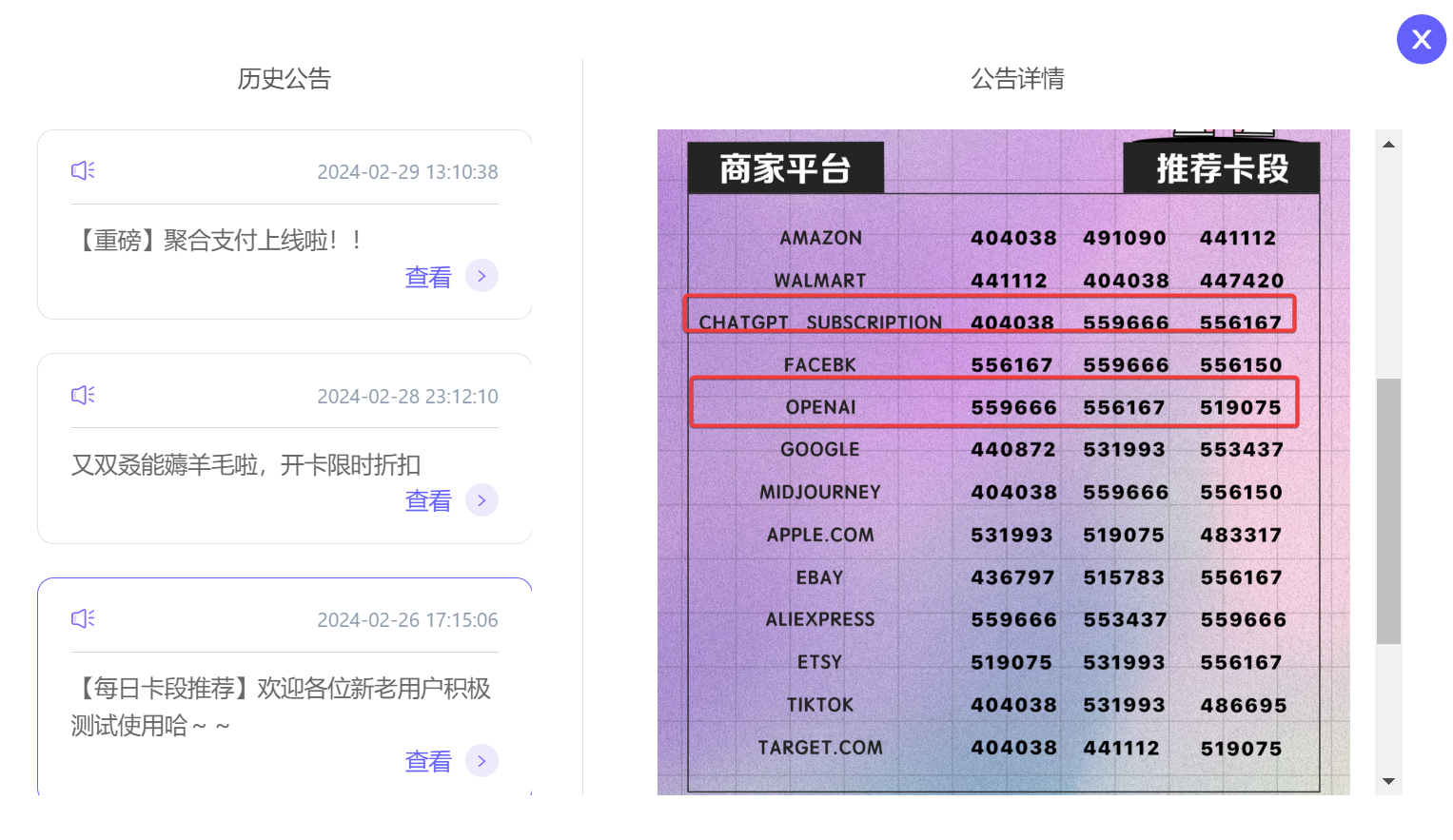
Note: For more information on card segments that support OpenAI/ChatGPT payments, please refer to: Summary of credit card binding for OpenAI/ChatGPT Plus, listing some supported credit card segments
Deleting Cards
For cards no longer in use, you can find and delete them in the "Card List." Deleting will refund the balance, but the card issuance fee and service fee will not be refunded. Note: It is recommended to unbind the card from the associated service provider before deleting any unused cards to avoid chargebacks.
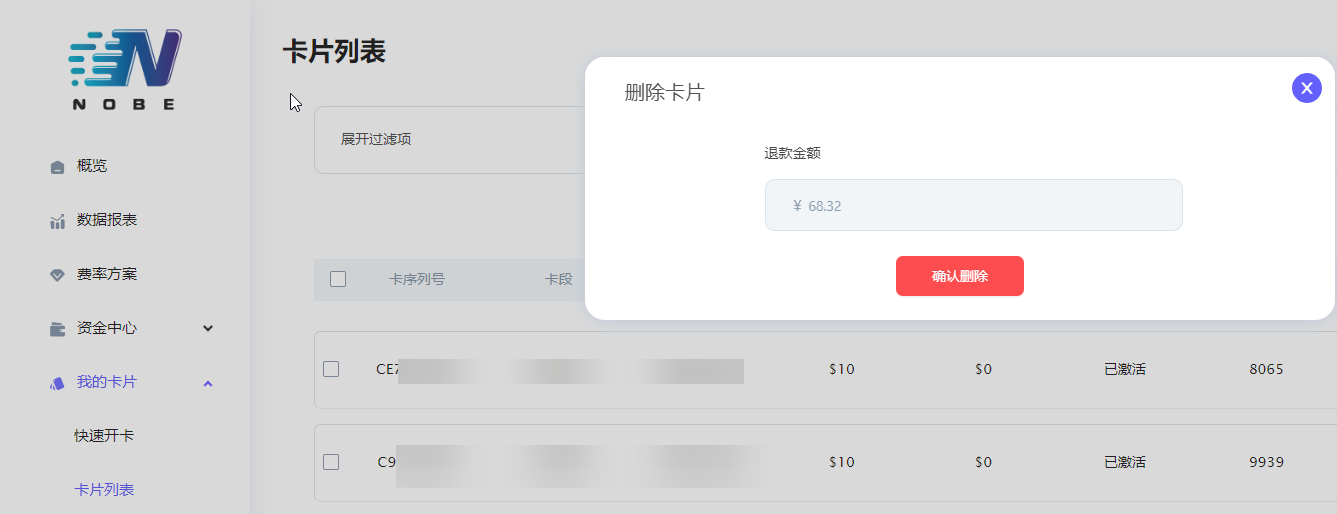
Security Concerns
There is not much information available online about Nobepay. I only found recommendations on some cross-border e-commerce blogs. A quick check of the domain whois information shows that the domain was registered on 2020-10-13.
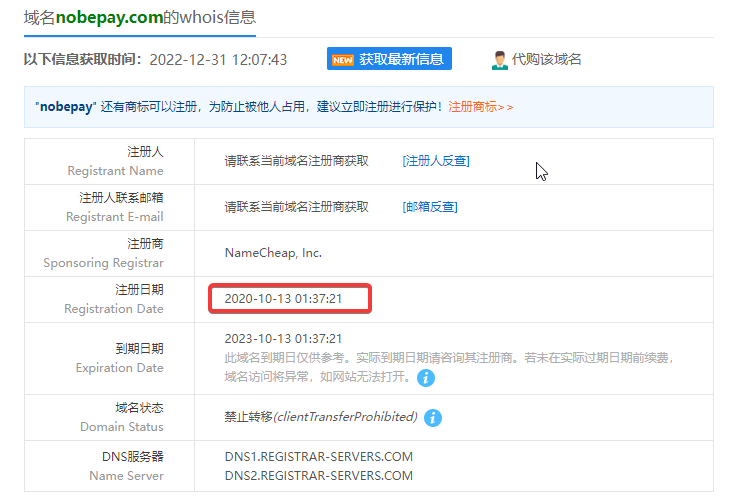
Safety and risks should be assessed by individuals. This site does not take responsibility for security. It is suggested not to recharge too much balance if you have doubts. It's not recommended to use it.
Conclusion
- Nobepay registration requires an invitation code and real-name authentication before use
- Online recharge only supports WeChat Pay, and the WeChat account must match the one used for real-name authentication, with a minimum recharge amount of 500 yuan
- Nobepay is suitable for users without physical credit cards but with a need for overseas shopping or for those concerned about the security of physical credit cards
- Before deleting a card on Nobepay, unbind the card from the associated service provider to avoid chargebacks
- Shortcomings: The virtual cards issued by Nobepay have a validity period of only 1 year, and there are card issuance fees and service fees
Nobepay registration link: https://nobepay.com/app/login?type=azmzep&code=0B1104E, Invitation code:
0B1104E
Comments

xiaoz
I come from China and I am a freelancer. I specialize in Linux operations, PHP, Golang, and front-end development. I have developed open-source projects such as Zdir, ImgURL, CCAA, and OneNav.
Random article
- Free 50GB Storage Space on MEGA, an Overseas Cloud Storage Platform
- Installing Sleeky Theme to Beautify YOURLS Short URL Program
- Automatically Add "nofollow" to External Links in WordPress Articles
- Apply for Free Multi-Domain SSL Certificates Provided by TrustOcean
- PHP Directory Listing Program Zdir Updated to v1.3
- Simple yet Powerful: A Beginner's Guide to UpNote Cross-platform Note-taking App
- Say goodbye to residual files! Free AppCleaner helps you easily uninstall Mac software
- [转] From Self-Study to Job Hunting: A Loser's Brave Adventure in Shanghai
- Zdir 1.0 Official Release: Directory Listing Program with File Search Support
- Nginx Reverse Proxy + Thumbor Image Cropping: Enhancing Nginx's Image Cropping Support